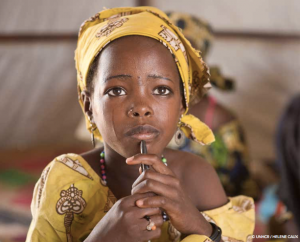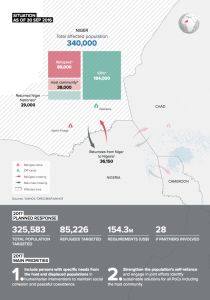by Michelle Wolf
The homes in my neighborhood typically sell pretty quickly. As each home is put up for sale, and that “SOLD” sign is inevitably hung, I find myself worrying about who is moving in. We’ll share an alley, the leaves from their maple trees will gracefully float into my treeless yard. I will hear the social gatherings organized in their backyards, and come to know their lawn-mowing habits. But one thing I do not have to worry about is sharing scarce vital resources. My home is fully equipped with water, food, electricity, and gas. There won’t be food shortages in our local grocery stores. I won’t worry whether or not this new family is connected to a terrorist group or if my medical care will suffer. I am able to sleep in the comfort of my own bed at the end of each day. It’s much different for those living in Diffa, Niger.
On-going Boko Haram conflict in Nigeria continues to force Nigerian families from their homes in search of refuge in southeastern Niger. An astonishing 50% of the native population of Diffa has been displaced, forced to the outskirts of towns or to isolated areas along Route Nationale 1, a main highway connecting eastern Niger western Niger. Tension between internally displaced Nigeriens and refugees continues to rise as scare resources are further depleted. The United Nations High Commissioner for Refugees (UNHCR) has outlined a response plan that is already being implemented. The key priority is to enhance social cohesion and peaceful coexistence by several cluster responses, while also strengthening institutional, community, and individual resilience. [site: NIGERIA – RRRP 2017: Niger at a glance]

Region refugee response plan (RRRP) partners will identify the most vulnerable households and provide them with adequate shelter so that families can live in dignity. Families will also be provided with Non-Food Items (NFI) kits, which contain basic household items. In addition, increased security measures will be put in place to protect at-risk children, particularly those who have been separated from their families and are unaccompanied. Registration and documentation of the population will be carried out to track movements and reduce the risk of statelessness.
Health sectors will aim to reduce mortality rates by providing access to medical services, vaccines, and free health clinic services to persons of concern. Cash for work programs will also be implemented. Strategic planning is underway to ensure equal access to uninterrupted education.
Access to basic needs and resources is extremely limited in Niger. The increase in displacement within the country is weakening the already vulnerable health of this nation. The plan set in place by UNHCR will strengthen the resiliency of the population and aid in providing vulnerable persons with the support necessary to remain self-sufficient during this time of crisis.

Stay tuned for more coverage on the Niger Refugee Response Plan from Michelle Wolf


